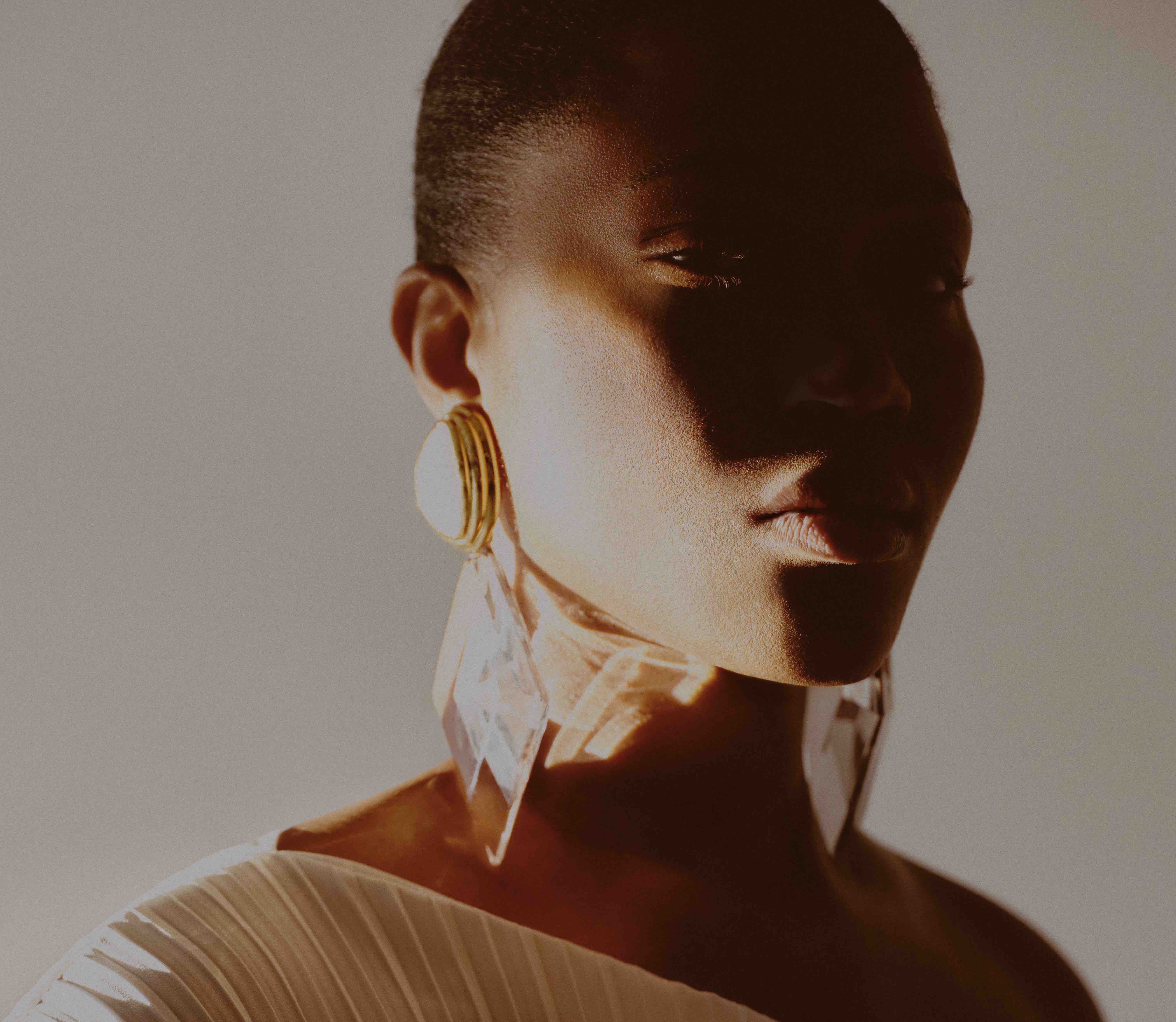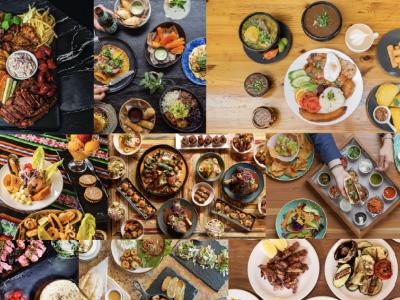It is a cold October day in São Paulo, Brazil’s largest city, as winter breaks into spring. In a Jeep Compass parked outside a shop selling Afro-Brazilian religious items sits Luedji Luna, the stage name of Luedji Gomes Santa Rita, one of Brazil’s biggest stars at the moment, hot off a phenomenal Tiny Desk performance. “The police have stopped right in front of the shop. My husband and son are inside,” she tells me. “I want to see if the police will do anything, because then I’ll get out of the car and make a scene.”
It is the only tense moment during my interview with Luedji Luna, which has unfolded with ease - a calm, melodic exchange carried by the rhythm of Luedji’s voice. Her slow, lyrical cadence oozes the spirit of Salvador, the capital of Bahia, where she was born and where Afro-Brazilian culture pulses through everyday life.
Dressed in a hoodie and wearing a cap, the singer’s concern is palpable. I can see her eyes scanning her surroundings to ensure the safety of her family — all of them Black, like her.
Only two weeks later, clad in a stylish suit, Luedji would float seamlessly though the glamour, glitz and applause of a Las Vegas ceremony to receive her Latin Grammy former album Um mar para cada um. She will thank her parents. But it is clear in our interview that she doesn’t need an award to tell her who she is:
“At this moment in my career, Lued Gomes Santa Rita and Luedji Luna are aligned. They’re no longer so separate. She’s the closest to who I truly am, to what I truly want,” she tells me, going on to explain: “Sometimes, as artists, we find ourselves having to play the game of the industry, meeting expectations that aren’t necessarily our own, desires that aren’t completely genuine. But right now, I feel that I’m showing the most human version of myself, and that’s what I want the world to see. It’s about the possibility of an artist being flawed, doubtful, vulnerable. Not a perfect or untouchable diva, not beautiful all the time, just human.”
And yet, Luedji did not look like an ordinary human up on that Grammy podium, the epitome of elegance and grace; she represents Bahia - the heartbeat of Black Brazil. As one of its strongest pulses, she carries the energy of its streets, its tides and its terreiros - the sacred community spaces in Afro-Brazilian religions like Candomblé and Umbanda, where music, dance and ritual connect people with their African ancestry. When Luedji sings on stages in London, Paris, or New York, her voice reminds us Brazilians that, however far from Brazil we are, there is always a drum calling us back.

When I received the news that I would be interviewing Luedji Luna, the scent of the trees, the voices singing and the rhythm of the atabaques replayed in my mind like a film: women in long white and yellow dresses walking alongside running children, men carrying fruit, drums, baskets and flowers, moving together towards the river, in a procession both silent and vibrant.
Luedji’s art is like a river, pouring into the ocean, crossing the Atlantic. There are no linguistic barriers to the poetry in her music; it is something you feel. Fluid, powerful, serene. Sacred and accessible. She is a body in the world, Um Corpo no Mundo, that needs space to breathe, to tell her story.
“Even here in Brazil, I always make a point of affirming my place as a Black woman. I don’t have a tragic story, which is often what people expect from a Black woman. I had both my parents. They're still alive. I had education, love, and a good upbringing. My parents valued education deeply; they invested in it. So I make a point of showing that there are Black families with both parents, families that are functional and loving. Fathers who raise their children, who care for them. It’s important that we tell those stories too.”
A daughter of Salvador, the city where the Atlantic whispers stories of crossing and survival, Luedji carries in her voice the Axé, the vital energy that moves and transforms. In Candomblé, axé means spiritual energy or life force, the sacred power that connects all living beings and the orixás (deities). It represents strength, balance, and the ability to create and transform, to tell a different story.
“There’s a line in philosophy that says truth is a lie told many times. So let’s keep retelling stories of love, success, tenderness until they become the norm. Bell Hooks also speaks of these functional Black families, and that they must cease to be seen as exceptions,” Luedji says. “As a Black Brazilian singer, I don’t conform to what’s expected of me. Traditionally, the Black woman in Brazilian music is associated with samba. For many years that was the image. What’s expected of me musically, I don’t deliver.”
Luedji’s music is made of faith and memory. Her verses remind us that faith is a form of survival - not the kind of faith that demands silence, but the kind that sings, dances, and invites healing. In her lyrics, beauty is political; African spirituality intertwines with tenderness, everyday life and resistance. It is a kind of prayer made with the whole body.
Of course, the issue of representation is a complex one: “The ideal would be for every Black person to be able to speak for themselves, without carrying the burden of representation. Can my story really encompass all the complexity of what it means to be a Black woman in the world?” sighs Luedji. “When I first came onto the scene, the idea of representation was something very present; people spoke a lot about it, and for good reason. We live in a country that still lacks our presence in spaces of power, in places that aren’t defined by violence, servitude, or vulnerability. Because we are so absent from positions of influence, from institutions, from politics, whenever one of us reaches those spaces, that person becomes precious, almost symbolic, and ends up carrying the heavy responsibility of speaking for everyone else who couldn’t make it there.”
To represent is not always something you choose, however, and you can’t always choose who you are representing, or control who feels represented by you. Luedji’s songs have become a meeting point for my students in the UK: young artists, DJs, dancers, capoeira players and jiu-jitsu practitioners from different parts of the world who find in Brazil a second home. They are moved by our resilience, that invisible strength which makes Brazilians keep smiling despite inequality, lack of opportunity, police violence, and racism.
“But that space of representation is limiting,” Luedji continues. ”For instance, Seu Jorge doesn’t need to be the only handsome one, the only heartthrob of his generation. There are so many beautiful Black men, not only in appearance but in essence”
In recent years, Brazilian music has captured renewed international attention, with producers and artists looking to Brazil for inspiration. “I’ve noticed this happening for quite some time now, I think Brazil is having a moment. It's kind of hype,” says Luedji, aware that she herself is now the focus of this attention, her inbox filled with messages from global names eager to work with her:
“Oddisee has already reached out to collaborate and shared some productions with me. John Key, who works with Solange Knowles — Beyoncé’s sister — has also sent me two productions.” She says, “I actually feel that people abroad are more atuned to this other Brazil beyond the samba stereotype than many Brazilians. They research more, they pay attention to what’s happening in the underground scene.”
Luedji has always resisted lending herself to being Brazilian export. For Black musicians in particular, being constantly associated with samba has often limited visibility and opportunity, and excludes innovative, quality art.
“My parents always listened to a lot of jazz and blues at home, and we travelled a lot too,” she tells me. ”That was my foundation. I think it’s reflected in the kind of music I make today, music that speaks to the world, or at least intends to, rather than this idea of ‘exportable Brazil’.”
Fortunately, there’s a growing audience abroad seeking exactly this kind of music, boundary-breaking and deeply rooted in identity, and Luedji Luna has found listeners who genuinely seek depth and authenticity.
“I’m not a mainstream artist in Brazil, but international artists and audiences still find me, they listen to my music, and they see value in what I do,” she says. “Beyond the pop everyone knows, my Brazil is already being accessed abroad by people who genuinely love music, especially producers and DJs. I’m already reaching that market.”
It’s no surprise, then, that Luedji Luna’s second-largest audience, after Brazil, is in the United States. And, as much as she hasn’t looked for fame and glory, it has now come, between our interview and its publication, in the form of a Latin Grammy.
Awards or no awards, Luedji will continue doing what she does. In a country that insists on silencing Black and female bodies, Luedji refuses to be just a beautiful voice. She is affirmation, protest, and self-care. Turning love, motherhood and Blackness into poetic trenches, she transforms the body into a political territory but also into a space of pleasure and freedom. And when audiences listen to her — especially Black women — they find mirrors. Luedji reminds us that resistance also means allowing oneself to feel.
Without having to create a persona or inventing a tragic backstory, Luedji is a woman with purpose, carrying in her body and soul a deep African ancestry that pulses through much of her music. Her album Bom Mesmo É Estar Debaixo D’Água (The Best Place to Be Is Underwater) feels like a deep dive into feminine waters vast, mysterious, and ancestral. “From carrying the world for so long, I learnt to fly.”
As I ask about what it means to inhabit a Black body in a violently racist society, Luedji’s audio begins to crackle. Through the screen, I can still see her glancing out the car window as if speaking to someone nearby. For a few seconds, the connection freezes and momentarily, as the background of Halloween merchandise fills the screen, my thoughts turn to how Black bodies were hunted just like “witches” were hunted in the Middle Ages. To my relief Luedji’s voice returns, though, unfortunately, not her face.
“We are vulnerable, exposed bodies. Black bodies living in an anti-Black country that wants to annihilate us,” she says in answer to my thoughts. “So, if we don’t hold onto something not necessarily the African-based religions, but to spirituality and to God we wouldn’t even have made it this far.”
What Luedji ‘holds onto’ is in her music. She sings to remember. To remember where we came from, who we are, and where we wish to go. She sings of love that heals, that stitches colonial wounds and rebuilds belonging; the love that crosses oceans, connecting Salvador to Lagos, Kingston, and London. Her verses touch the pain of a people, but also their joy. And it is in that fusion between pain and celebration that revolution dwells.
“There’s no greater violence in history than what was done to enslaved peoples. If we’re still here, it’s because of an invisible, ancestral force that sustains us. The project is still ongoing. We do not die. We don’t end. We don’t disappear. Because we have them, our ancestors, the orixás,” she continues. “It’s in them that I find the courage to have a Black family, a Black husband, a Black child. It’s in them that I place my trust, because the State cannot be trusted."
As I finish editing the interview, messages begin flooding in from Brazil after yet another massacre in the favelas of Rio. Over a hundred Black bodies, including kids, fathers, students, even church people, killed. And once again, I am reminded of Luedji Luna’s words: “We don’t end. We don’t ever disappear.”
Luedji Luna symbolises a Brazil that insists on reinventing itself, that keeps dancing even in the storm. A woman who understands that the act of creating is also the act of healing. “My music is healing for me and for those who listen. It’s a prayer.” The sacred lies precisely there: in the one who sings, in the one who listens, in the one who allows themselves to feel. Perhaps that is what Luedji teaches us: that singing is also praying. And that, deep down, we are all made of water, Axé, and hope.















